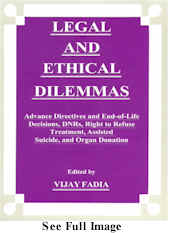
|
Legal and Ethical Dilemmas |
Upon completing the course you'll be able to:
Explain two kinds of advanced directives: Living Wills, Durable Power of Attorney for Health Care.
Explain patient self determination act and describe the responsibilities of a health care provider under it.
Explain why anyone would need an advanced directive.
Describe two benefits of appointing a health care agent.
Describe two things one should do to ensure that his or her advanced directives will be honored.
Distinguish between a will, a living trust, and a living will.
Distinguish between a power of attorney and a durable power of attorney and a durable power of attorney for health care.
Durable power of attorney or living Will?
Explain the uses and respective advantages and disadvantages of a Durable Power of Attorney and a Living Will.
List 6 duties of the Attorney-in-Fact.
Explain "spring" Durable Power of Attorney.
12. Discuss with a patient at least 6 common misconceptions concerning advanced directives.
13. Explain the following medical treatments:
14. Formulate a values questionnaire to assist individuals upon end of life treatment decisions.
15. Define artificial nutrition and hydration.
16. Distinguish artificial nutrition and hydration from ordinary eating and drinking.
17. Explain the consequences of the withdrawal of artificial nutrition and hydration.
19. Explain what a DNR is, and discuss its application with a patient.
20. Distinguish between a hospital and non-hospital DNR orders.
21. Discuss 7 guidelines for the appropriate use of DNR orders.
22. List 3 advantages of dying at home.
23. Define hospice.
24. Discuss legal considerations concerning dying at home decisions.
25. Discuss the role of ethics committees and patients right to make end-of-life decisions.
26. Discuss the legal standing of third parties intervening with a persons end of life decision.
28. Discuss various provisions and implications of Oregons Assisted Suicide Law.
29. Discuss the need for Organ Donation and provisions of the Uniform Anatomical Gift Act (UAGA).
Evaluation of Individual Objectives
- When to stop medical treatment.
- When a health care provider won't honor an advance directive
- Federal law on advance directives
- The difference between a "Will" and "Living Trust"
- The difference between a "Power of Attorney" and "Durable Power of Attorney"
Chapter 2: Durable Power of Attorney or Living Will
Chapter 3: Common Misconceptions
- Restrictions on tube feeding and hydration
- The rules for appointing a health-care agent
- Appointing a health care agent
Chapter 4: Medical Treatments and Your Advances Directives
- Discuss medical treatment with a doctor
- Pain management
- Stopping a medical treatment
- Values Questionnaire
- Overall attitude toward life
- Thoughts about independence and control
- Overall attitude toward health
- Attitude toward illness, dying and death
- Perception of your doctor & other caregivers
- Personal relationship
- Religious background and relief
Chapter 5: Artificial Nutrition And Hydration
- Artificial nutrition and hydration
- Side effects from artificial nutrition and hydration
- Artificial nutrition and hydration different from ordinary eating and drinking
- Withdrawal of artificial nutrition and hydration
- Appropriate to give artificial nutrition and hydration
- Advantages on refusing nutrition
- Laws abut artificial and hydration
- Stopping an artificial nutrition and hydration
- A doctor insisting on providing artificial nutrition and hydration
- Refusing artificial nutrition and hydration
- Life insurance policies affecting life sustaining treatments
- Medical community on ethically permissible to stop artificial nutrition and hydration
- Nursing homes and hospital agree on stopping artificial and hydration
- Use of artificial and hydration
Chapter 6: CPR, DNR and End-of-Life Decisions Cardiopulmonary Resuscitation
- Someone refusing a CPR
- Do-not-resuscitate order
- DNR order
- Instructions in a living will enable a person to avoid CPR
- DNR orders governed by the law
- Consenting to a DNR order
- Discussing a DNR order with a physician
- Questions to ask about DNR to a physician
- Revoking a DNR order
- Non-hospital Do-Not-Resuscitate order
- A hospital DNR order
- A non-hospital DNR orders
- Living will or medical power of attorney be honored by EMS personnel
- Non-hospital DNR orders governed by state law
- Revoking a non-hospital DNR orders
- Discussion of Legal and Ethical Issues
- Guidelines for the Appropriate Use of Do-Not-Resuscitate Orders
Chapter 7: Dying At Home
- A person right to die at home
- Advantage to die at home
- Disadvantages to die at home
- A doctor's role when a patient is dying at home
- Hospice
- Difference between a home health care and hospice
- Cost of hospice or home health care
- Hospital responsibilities toward a person who has decided to die at home
- Families member legal risk allowing a loved ones to die in their homes
- Person dying at home changed his or her mind
- How to prepare a dying person's discharge
- Care-plan
- How to prepare for their love one's death
- Non-hospital DNR order
- Preventing unwanted hospitalization
- Stopping medical treatment at home without the doctor's knowledge
- Family risk for proving too much pain medication
- Supporting a loved one throughout the dying process
- Support for the family
- How to know when a loved one is near to death
- How to make sure that their loved one is dead
- Who to call after the death
- Calling 911 after the person's death
- Signing the death certificate
- Autopsy
Chapter 8: Ethics Committees and End-Of-Life Decisions
Chapter 9: Third Parties Can They Take Away Your Rights
Chapter 11: Oregon's Assisted Suicide Law
Chapter 12: Organ Donation
- Considering an organ donor
- Laws that govern organ donation
- Advance directives to donate organs
- Conflict existing between an advance directives and donating an organ
"I found this course interesting and informative." -C.R., RN, MI
"Excellent class! A great way to meet the ethics requirement." -C.O., LCSW, CA
|
© 2007 Homestead Schools, Inc. - Webmaster : Shawn J. Cassick |